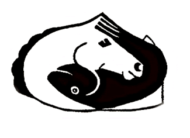What makes an educated pair of successful professionals quit their jobs, sell their home, and move to Belize? In our case, it was a quest for new perspective. After years of viewing the world through a first-world lens, we felt it was time for a fresh start.
To come up with a plan, we met twice a week, in the hot tub or at the kitchen table. We listed the things we wanted more of in our lives, like togetherness, fresh air, animals, and good food. Then we listed the things we wanted less of, such as pollution, crowds, winter, and commuting. Ultimately, we chose the caretaking route and sent a letter to the owners of the Belizean jungle lodge where we had stayed and ridden on vacation. “Hello,” we wrote, “we have lots of experience in business, restaurants, and horses. Would you be willing to give us room and board for a year in exchange for our help?”
We received an enthusiastic reply and they proposed we move into their home and manage the lodge for a year starting in June of 1997. Within a couple of months, Bob left his job, I shuttered my horse boarding business, and we sold our little farm in Virginia.
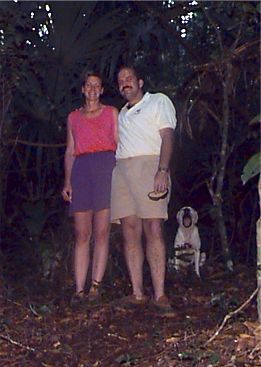
Our life in Belize is everything we hoped for—the pace of life, refreshingly slow. The people here are friendly, mind their own business, and have very few expectations. We rarely hear anyone blame someone or something else for their position in life. Most folks don’t own much, so no need for insurance or security alarms. People have a simple, easily-maintained lifestyle with lots of time to enjoy family, friends, and nature. Many of their homes are built from material available in the forest. Few Belizeans own vehicles, eliminating the need for car payments, insurance, and gasoline. Family milpas (gardens) are common and therefore the grocery bills are low.
Life in a developing country can be a challenge, but in a good way. Every day brings its own agenda and we cannot always impose our will upon our environment. Things that work one day, mysteriously refuse to the next, and then return to their former condition without intervention. We jokingly blame our technical failures on the “duende,” that mischievous elf of the rain forest. It’s sobering to realize that we are not in control; yet that knowledge liberates us from the burden of responsibility. There’s little reason for anger or despair because tomorrow will bring a totally different set of circumstances. Getting through the day is cause for celebration, which we do with coconut rum and mango juice on our verandah looking out over the rainforest hills and pastures. After sunset, we go to bed, pleased with our efforts and slip into a long and peaceful sleep.
We wake to the cacophony of birdcalls celebrating another dawn. One of our greatest pleasures is shopping for food on the property. Under every producing tree lie “seven sticks.” They have a hook at one end that’s perfect for snagging high branches to make fruit fall to the ground. We grow avocados, breadfruit, mangos, oranges, grapefruit, tangerines, lemons, and limes without insecticides or fertilizers. Breadfruit is indescribably delicious when fried and served alongside eggs and cheese. Its flavor reminds us of fresh bread or baked potatoes.
The area we live in is classified as broadleaf rainforest with a canopy between thirty and seventy feet high. The jungle is thick with vines, palms, bromeliads, and various epiphytes (orchids and “air plants’) despite a long dry season. When it finally comes, rain is a joy shared by all. We have not yet seen any of the large cats that are known to be in our area – ocelot, jaguarundi, margay, jaguar, and mountain lion, but have seen their tracks and smelled their scent.
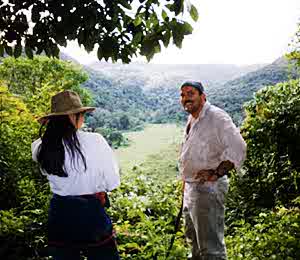
About a mile away, there is a lush valley called the Vega where we graze the horses when they are not working. It features a small Mayan ruin, a crystal clear stream, and a dry cave that is quite impressive with its Mayan pottery, stalactites, and bats. The Vega is home to tapirs, mountain lions, ocelots, and many species of birds and butterflies. Once a week, we ride to the Vega to round up the herd and move them up to the lodge. After we’ve doctored anyone in need of doctoring and chosen fresh mounts for incoming guests, we drive the others back to the valley.
Many of the trees and other plants can be used for medicinal purposes. When we feel ill, we hack up a vine and boil it for a healing, bitter tea. Headaches respond to a cold poultice of the “sandpaper vine” and allspice tea soothes a sore throat. Our Mayan guides are happy to share their rich knowledge of rain forest medicine with us.
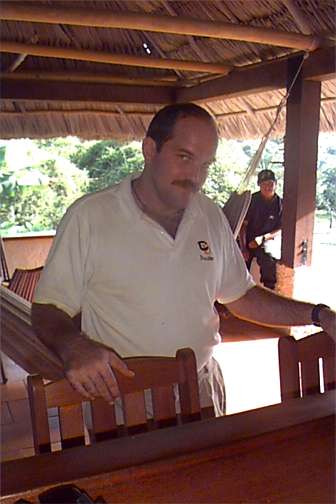
We have been busily deciphering the southern sky on clear nights. The heavens are stunningly bright because there is no light pollution. Bob gives most of our guests a “star tour” after dinner. Another evening activity is the “night walk” in which we take flashlights and walk down the Allspice Trail through the bush in search of wildlife. Two-thirds of the wildlife here is nocturnal.
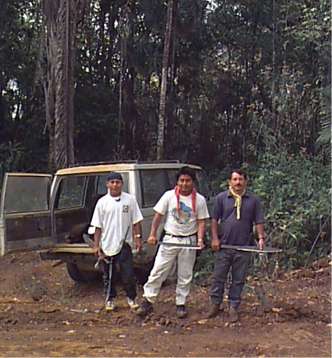
We take great pleasure in tending this piece of earth with enough time to sit and appreciate our work. Keeping back the jungle is a constant chore. The locals learn to use machetes when they are about five years old and everyone has a file for keeping them sharp. Our co-workers make their blades sing as they cut through the bush. Then there’s a pause as everyone sharpen their blades, passing the time by sharing machete-scar stories which get better with each telling.

Bob’s three daughters, Emily, Amy, and Molly came down for the summer to help us settle in and we were impressed at how much of themselves they put into the business. They chatted up guests, tended horses, and did laundry.
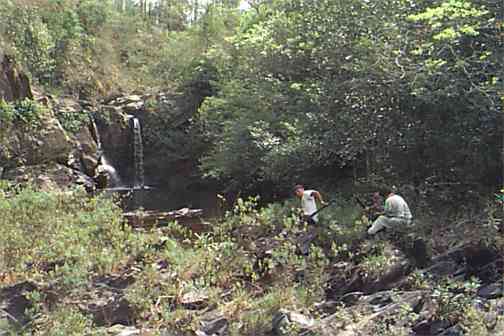
One of Bob’s greatest strengths is the ability to create a team. It is wonderful to see how well everyone works together under his supervision. Our team consists of three families who live on the property and one woman from a nearby village. With only eight people, we are able to maintain the grounds, pastures, riding trails, and rooms as well as provide meals, tours, and transportation for our guests.
Halfway through our first year, we are tickled by how well our skills complement each other: Bob’s business sense, resourcefulness, and his ear for language, and my understanding of kitchens, horses, and how to make do with less. We now see that the really important things in life are the simplest: fresh air, clean water, a dry roof, good food, hard work, and time to relax. This beautiful place has given us time to see what we are made of, to pool our resources, realign our values, and cement our commitment to a life together.
